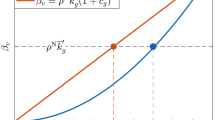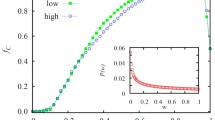Abstract
How robust is the welfare state when confronting open borders? To answer that question, we develop an evolutionary game-theoretic model combined with an ingroup–outgroup model. The simulations reveal that welfare states in general will transform into low-welfare societies unless the societies in time generate a sufficiently large amount of social recognition of the reciprocators in such a crisis. The recognition implies that the “always cooperators” in favour of supportive policies towards free riders need to step down and hand over privileges to those willing to reciprocate, namely the “willing punishers”. The open-border society is modelled by letting a small amount of random types enter the society each year. Interestingly, it is not the defectors who compromise high-welfare societies. Instead, it is the excessive presence of cooperators who crowd out the reciprocators, thus making society increasingly vulnerable to free riding. This accentuates the need for timely recognition and actions against the risk of moving towards a low-welfare society.



Similar content being viewed by others
Notes
We use the two-person prisoner’s dilemma game (Table 1) as a reference for how individuals interact. Although highly stylized, the game has been applied widely in modelling actual human interactions.
The experiment of Quervain et al. (2004) report a positive correlation between activity in certain parts of the brain and the willingness to incur costs to punish. The fact that people differ in those brain activities may explain why only a fraction of subjects are willing to punish in experiments.
Let \(\pi^{i} \left( {i,j} \right)\) be payoff of type \(i\) from meeting type \(j\), while let \(\pi^{j} \left( {i,j} \right)\) be type \(j\)’s payoff from meeting type \(i\). The direct payoffs are \(\pi^{WP} \left( {WP,AD} \right) = a\) and \(\pi^{AD} \left( {WP,AD} \right) = d\). Punishment costs for the Willing Punisher type are \(p^{WP} > 0\) and the effects of punishment costs on Always Defectors are \(p^{AD} > p^{WP}\). For simplicity, we assume that \(a - p^{AD} = d - p^{WP} = p\).
Definition of an evolutionary stable strategy. The two strategies \(i,j\), can be depicted as follows. Assume that strategy \(j\) has a very low frequency when it begins attempting to invade the population. Furthermore, assume that strategy \(i\) is stable if \(E\left( {i,i} \right) > E\left( {j,i} \right)\) or \(E\left( {i,i} \right) = E\left( {j,i} \right)\; and\; E\left( {i,j} \right) > \left( {j,j} \right)\).
Proof that a proportion of Willing Punishers exist in society, denoted by \(\bar{X}^{WP}\), below which \(X_{t}^{AD} \to 1\). Let \(X_{t}^{AD}\) be small, denoted by \(\varepsilon_{t}\). We have that \(\Pi _{t}^{AC} -\Pi _{t}^{WP} = \varepsilon_{t} \left( {d - p} \right) > 0.\) Therefore, over time, \(\frac{{X_{t}^{AC} }}{{X_{t}^{WP} }}\) increases. If we assume that \(\varepsilon_{t}\) is extremely small such that the average payoff in society is approximately c, then we have that \(\Pi _{t}^{AD} = dX_{t}^{AC} + pX_{t}^{WP}\), while \(\Pi _{t}^{A} = c\). \(\Pi _{t}^{AD} =\Pi _{t}^{A}\) if \(d(1 - X_{t}^{WP} ) + pX_{t}^{WP} = c = > c = > \bar{X}_{t}^{WP} = \frac{c - d}{p - d}\). If \(= 4,\, d = 6,\, p = - 1 = > \bar{X}^{WP} \cong 0.28\).
Facchini (2016) describes a feedback model wherein an individual believes that action A will result in outcome B. However, if information invalidates that belief, a state of cognitive dissonance occurs, which will open a ‘window’ of opportunity for reform. Denial or withholding of information can postpone that opportunity. If, over time, mounting evidence contradicts the initial belief, the justification cost increases. Again, according to Facchini (2016), individuals are inclined to change their ideologies when justification costs become excessively high. Such costs will rise if a growing number of individuals oppose the initial beliefs, if scientific authorities condemn those beliefs or simply when the cost of withholding evidence is excessively high. In our setting, changing ideology simply means supporting another narrative. See also Kaplan et al. (2016) for a neurological explanation of such political confirmation bias.
See Brandt (2014) for an explanation and consequences of such a policy process.
References
Andersen, T. M. (2004). Challenges to the scandinavian welfare model. European Journal of Political Economy, 20(3), 743–754.
Balafoutas, L., Nikiforakis, N., & Rockenbach, B. (2014). Direct and indirect punishment among strangers in the field. Proceedings of the National Academy of Sciences of the United States of America, 111(45), 15924–15927. https://doi.org/10.1073/pnas.1413170111.Pubmed:25349390.
Barrett, A., & McCarthy, Y. (2008). Immigrants and welfare programmes: Exploring the interactions between immigrant characteristics, immigrant welfare dependence, and welfare policy. Oxford Review of Economic Policy, 24(3), 542–559.
Bayer, P., Ross, S. L., & Topa, G. (2008). Place of work and place of residence: Informal hiring networks and labour market outcomes. Journal of Political Economy, 116(6), 1150–1196.
Bergh, A., & Bjørnskov, C. (2016). Burying the bumblebee once and for all: Does big government hurt growth less in high-trust countries? IFN working paper 1119 (published March 21, 2016).
Bertilsson, M., & Hjorth-Andersen, C. (2009). The Nordic welfare state. In G. T. Svendsen & G. L. H. Svendsen (Eds.), Handbook of social capital: The troika of sociology, political science and economics (pp. 212–227). Cheltenham, UK: Edward Elgar Publishing.
Bevir, M., & Rhodes, R. A. W. (2010). The state as cultural practice. Oxford: Oxford University Press.
Borjas, G. J. (1999). Heaven’s door. Princeton, NJ: Princeton University Press.
Brandt, U. S. (2014). The implication of extreme events on policy responses. Journal of Risk Research, 17(2), 221–240.
Brandt, U. S., & Svendsen, G. T. (2010). The survival of the Nordic welfare state and social trust. Nordic Journal of Political Economy, 36, 1–15.
Bratsberg, B., Raaum, O., & Røed, K. (2014). Immigrants, labour market performance and social insurance. Economic Journal, 124(580), F644–F683.
Chen, R., & Chen, Y. (2011). The potential of social identity for equilibrium selection. American Economic Review, 101(6), 2562–2589.
Chen, Y., & Li, S. X. (2009). Group identity and social preferences. American Economic Review, 99(1), 431–457.
de Quervain, D. J.-F., Fischbacher, U., Treyer, V., Schellhammer, M., Schnyder, U., Buck, A., et al. (2004). The neural basis of altruistic punishment. Science, 305(5688), 1254–1258.
Dickinson, D. L., Masclet, D., & Peterle, E. (2018). Discrimination as favouritism: The private benefits and social costs of in-group favouritism in an experimental labour market. IZA discussion papers, No. 10599. European Economic Review (Vol. 104, pp. 220–236).
Dong, Y., Li, C., Tao, Y., & Zhang, B. (2015). Evolution of conformity in social dilemmas. PLoS ONE, 10(9), e0137435.
Esping-Andersen, G. (1990). The three worlds of welfare capitalism. Princeton, NJ: Princeton University Press.
Facchini, F. (2016). Political ideological shift: A theoretical approach. Social Science Information, 55(4), 589–602.
Fehr, E., & Fischbacher, U. (2004). Third-party punishment and social norms. Evolution and Human Behaviour, 25(2), 63–87.
Fehr, E., & Gächter, S. (2000). Cooperation and punishment in public goods experiments. American Economic Review, 90(4), 980–994.
Fong, C. M., Bowles, S., & Gintis, H. (2006). Reciprocity and the welfare state. In J. M. Ythier & S. C. Kolm (Eds.), Handbook on the economics of giving, reciprocity and altruism (Vol. 2, pp. 1439–1464). North-Holland/Elsevier: Elsevier.
Fu, F., Tarnita, C. E., Christakis, N. A., Wang, L., Rand, D. G., & Nowak, M. A. (2012). Evolution of in-group favouritism. Scientific Reports, 2, 460.
Gächter, S., Herrmann, B., & Thöni, C. (2010). Culture and cooperation. Philosophical Transactions of the Royal Society of London. Series B, Biological Sciences, 365(1553), 2651–2661.
Hajer, M., & Wagenaar, H. (Eds.). (2003). Deliberative policy analysis: Understanding governance in the network society. Cambridge: Cambridge University Press.
Hauser, O. P., Nowak, M. A., & Rand, D. G. (2014). Punishment does not promote cooperation under exploration dynamics when anti-social punishment is possible. Journal of Theoretical Biology, 360, 163–171.
Hillman, A. L. (2010). Expressive behaviour in economics and politics. European Journal of Political Economy, 26(4), 403–418.
Imhof, L. A., Fudenberg, D., & Nowak, M. A. (2005). Evolutionary cycles of cooperation and defection. Proceedings of the National Academy of Sciences of the United States of America, 102(31), 10797–10800.
Jensen, C., & Svendsen, G. T. (2011). Giving money to strangers: European welfare states and social trust. International Journal of Social Welfare, 20(1), 3–9.
Kaplan, J. T., Gimbel, S. I., & Harris, S. (2016). Neural correlates of maintaining one’s political beliefs in the face of counterevidence. Scientific Reports, 6, 39589.
Lindbeck, A. (1995). Welfare state disincentives with endogenous habits and norms. Scandinavian Journal of Economics, 97(4), 477–494.
Lindbeck, A. (2008). Prospects for the welfare state. IFN working paper, No. 731. Research Institute for Industrial Economics, Stockholm.
Lindbeck, A., Nyberg, S., & Weibull, J. W. (1999). Social norms and economic incentives in the welfare state. Quarterly Journal of Economics, 114(1), 1–35.
Lindbeck, A., Nyberg, S., & Weibull, J. W. (2003). Social norms and welfare state dynamics. Journal of the European Economic Association, 1(2–3), 533–542.
Meadows, D. H., Meadows, D. L., Randers, J., & Behrens, W. W. (1972). The limits to growth. New York: Universe Books.
Morgan, T. J. H., Rendell, L. E., Ehn, M., Hoppitt, W., & Laland, K. N. (2012). The evolutionary basis of human social learning. Proceedings of the Royal Society of Biology, 279(1729), 653–662.
Nannestad, P. (2004). Immigration as a challenge to the Danish welfare state? European Journal of Political Economy, 20(3), 755–767.
Nannestad, P. (2007). Immigration and welfare states: A survey of 15 years of research. European Journal of Political Economy, 23(2), 512–532.
Nannestad, P., & Green-Pedersen, C. (2008). Keeping the bumblebee flying: Economic policy in the welfare state of Denmark. In E. Albæk, L. C. Eliason, A. S. Nørgaard, & H. M. Schwartz (Eds.), Crisis, miracles, and beyond: Negotiated adaptation of the Danish welfare state (pp. 33–74). Aarhus: Aarhus Universitetsforlag.
Nowak, M. A. (2012). Evolving cooperation. Journal of Theoretical Biology, 299, 1–8.
Oliver, P. (1980). Rewards and punishments as selective incentives for collective action: Theoretical investigations. American Journal of Sociology, 85(6), 1356–1375.
Ostrom, E. (2000). Collective action and the evolution of social norms. Journal of Economic Perspectives, 14(3), 137–158.
Paldam, M. (2004). Introduction to the 2003 European Public Choice Society plenary lectures: The Nordic welfare state—success under stress. European Journal of Political Economy, 20(3), 739–742.
Poulsen, A. U., & Svendsen, G. T. (2005). Social capital and endogenous preferences. Public Choice, 123(1–2), 171–196.
Rowthorn, R. (2008). The fiscal impact of immigration on the advanced economies. Oxford Review of Economic Policy, 24(3), 560–580.
Sarvimäki, M. (2011). Assimilation to a welfare state: Labour market performance and use of social benefits by immigrants to Finland. Scandinavian Journal of Economics, 113(3), 665–688.
Scheepers, D., Spears, R., Doosje, B., & Manstead, A. S. R. (2006). The social functions of ingroup bias: Creating, confirming, or changing social reality. European Review of Social Psychology, 17(1), 359–396.
Schultz-Nielsen, M. L. (2017). Labour market integration of refugees in Denmark. Nordic Economic Policy Review, 520, 45–72.
Svendsen, G. L. H., & Svendsen, G. T. (2016). Trust, social capital and the Scandinavian welfare state: Explaining the flight of the bumblebee. Cheltenham, UK: Edward Elgar Publishing.
Traulsen, A., Hauert, C., De Silva, H., Nowak, M. A., & Sigmund, K. (2009). Exploration dynamics in evolutionary games. Proceedings of the National Academy of Sciences of the United States of America, 106(3), 709–712.
Van Kersbergen, K., & Manow, P. (2014). The welfare state. In D. Caramani (Ed.), Comparative politics (3rd ed., pp. 520–545). Oxford: Oxford University Press.
Acknowledgements
An earlier version of this paper was presented at the European Public Choice Meeting in Budapest, April 2017, and we deeply thank the other participants. Furthermore, a special note of thanks goes to three anonymous reviewers and the editor for helpful comments.
Author information
Authors and Affiliations
Corresponding author
Rights and permissions
About this article
Cite this article
Brandt, U.S., Svendsen, G.T. How robust is the welfare state when facing open borders? An evolutionary game-theoretic model. Public Choice 178, 179–195 (2019). https://doi.org/10.1007/s11127-018-0622-5
Received:
Accepted:
Published:
Issue Date:
DOI: https://doi.org/10.1007/s11127-018-0622-5




